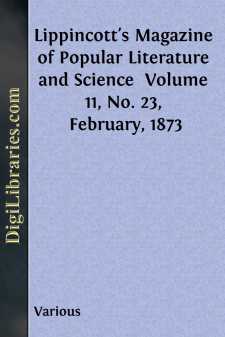Categories
- Antiques & Collectibles 13
- Architecture 36
- Art 48
- Bibles 22
- Biography & Autobiography 813
- Body, Mind & Spirit 142
- Business & Economics 28
- Children's Books 15
- Children's Fiction 12
- Computers 4
- Cooking 94
- Crafts & Hobbies 4
- Drama 346
- Education 46
- Family & Relationships 57
- Fiction 11828
- Games 19
- Gardening 17
- Health & Fitness 34
- History 1377
- House & Home 1
- Humor 147
- Juvenile Fiction 1873
- Juvenile Nonfiction 202
- Language Arts & Disciplines 88
- Law 16
- Literary Collections 686
- Literary Criticism 179
- Mathematics 13
- Medical 41
- Music 40
- Nature 179
- Non-Classifiable 1768
- Performing Arts 7
- Periodicals 1453
- Philosophy 64
- Photography 2
- Poetry 896
- Political Science 203
- Psychology 42
- Reference 154
- Religion 513
- Science 126
- Self-Help 84
- Social Science 81
- Sports & Recreation 34
- Study Aids 3
- Technology & Engineering 59
- Transportation 23
- Travel 463
- True Crime 29
Lippincott's Magazine of Popular Literature and Science Volume 11, No. 23, February, 1873
by: Various
Description:
Excerpt
CONCLUDING PAPER.
Early on a brilliant morning, with baggage repacked, and the lessening amount of provisions more firmly strapped on the shoulders of the Indians, the explorers left their pleasant site on the banks of the Maniri. The repose allowed to the bulk of the party during the absence of their Bolivian companions had been wholesome and refreshing. The success of the bark-hunters in their search for cinchonas had cheered all hearts, and the luxurious supper of dried mutton and chuno arranged for them on their return gave a reminiscence of splendor to the thatched hut on the banks of the stream. This edifice, the last of civilized construction they expected to see, had the effect of a home in the wilderness. The bivouac there had been enjoyed with a sentiment of tranquil carelessness. Little did the travelers think that savage eyes had been peeping through the forest upon their fancied security, and that the wild people of the valleys who were to work them all kinds of mischief were upon their track from this station forth.
The enormous fire kindled for breakfast mingled with the stain of sunrise to cast a glow upon their departure. Across the vale of the Cconi, as though a pair of sturdy porters had arisen to celebrate their leavetaking, the cones of Patabamba caught the first rays of the sun and held them aloft like hospitable torches. These huge forms, soldered together at the waist like Chang and Eng, and clothed with shaggy woods up to the top, had been the guardian watchers over their days in the ajoupa at Maniri. The sun just rising empurpled their double cones, while the base and the surrounding landscape were washed with the neutral tints of twilight.
After passing the narrow affluent after which the camping-ground of Maniri was named, the party pursued the course of the Cconi through a more level tract of country. The stones and precipices became more rare, but in revenge the sandy banks soon began to reflect a heat that was hardly bearable. As the implacable sun neared its zenith the party walked with bent heads and blinded eyes, now dashing through great plains of bamboos, now following the hatchets of the peons through thickets of heated shrubbery.
Whenever the country became more wooded in its character, the bark-hunters, whose quest obliged them to stray in short flights around the wings of the column, redoubled their mazes. The careless air of these Bolivian retrievers, their voluntary doublings through the most difficult jungles, and their easy way of walking over everything with their noses in the air, proved well their indifference to the obstacles which were almost insurmountable to the rest.
The Cones of PatabambaNothing could be more singular and interesting than to see them consulting one by one the indications scattered around them, and deciding on their probabilities or promises. Where the height and thickness of the foliage prevented them from seeing the sky, or even the shade of the surrounding green, they walked bent toward the ground, stirring up the rubbish, and choosing among the dead foliage certain leaves, of which they carefully examined the two sides and the stem....












